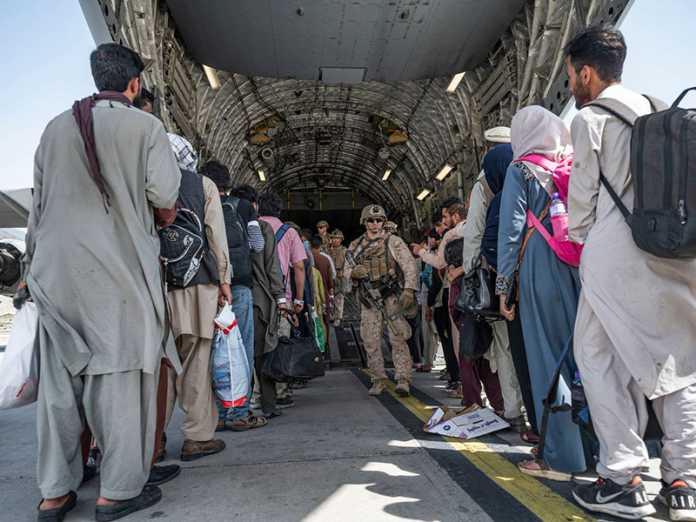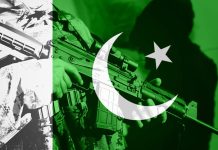The process of western withdrawal from Afghanistan in August and the scenes at Kabul airport as western allies were ushered out of the country to comply with Taliban demands were about as bad as these processes ever get; inhumane, incoherent and incomplete. It marked a straight strategic failure for the United States and – as its closest ally – for Britain.
The Realities of Failure
It leaves Afghanistan a worse security problem for the west than before the intervention of 2001; a Taliban government now more dominant across the country than in the 1990s, with terrorist and warlord groups already baked into the mix, and a western alliance much less inclined collectively to stand up for itself than twenty years ago.
The American-led Afghan policy had been steadily failing since 2012. But that retrievable failure was turned into a disaster by President Trump’s foolish negotiating strategy with the Taliban, and then into a presentational catastrophe by President Biden’s decision just to cut and run. Like other western partners, Britain had no choice but to cut and run with it, and now fully shares in the international ignominy and the betrayal of those Afghans who were persuaded to believe in western policy.
Even more than the US, Britain has little else to offer Afghanistan than a prayer for the weak and a cheer for the brave. Except that now the weak are the brave, and the world watches to see if those elements of Afghan civil society that were nurtured over twenty years and who trusted us are capable of standing up to the Islamo-fascism of the Taliban – the girls in school, the small businesses, the journalists, the lawyers and doctors, the sports teams. If so, then they will be doing it with no more help than our good wishes.
The British government tried to put a brave face on the situation, but in the US, Chairman of the Joint Chiefs of Staff, General Milley was quite straightforward in the assessment he offered to Congress at the end of September: ‘The war was a strategic failure’, he said, ‘there’s a cumulative effect to a series of strategic decisions that go way back’.
Milley’s remarks were a recognition that the strategic failure in Afghanistan was a long-term one; a collision of aspirations with some hard realities. Whether the final withdrawal could have been handled differently, the strategic failure goes much deeper than in the events of 2021 and it cannot be shrugged off as just one botched operation.
For a country like Britain, that long-term failure throws up some significant strategic challenges which further emphasise the reality that we have not just been living through an era of change, but more likely a change of era. The outcome in Afghanistan has pin-pointed it.
Strategic Costs
In March the British government produced the ‘Integrated Review’ – its strategic judgement on how Brexit had propelled a ‘global Britain’ orientation for the future. The review was explicit in naming China and Russia – in their own distinctive ways – as Britain’s chief strategic adversaries for the future. These are the two major powers who have gained the most geopolitical advantage from the Afghanistan situation. US influence across Central Asia has effectively ended; western economic and political ideals are in retreat and troubled countries like Afghanistan, Pakistan, Bangladesh or Turkmenistan have little choice but to lean on China, both for political support and essential financial assistance if the IMF and western powers try to boycott the Taliban government. Beijing talks with Taliban leaders predated the fall of Kabul by some time. Taliban leaders were reportedly clear that they understood China’s need for reassurance that the East Turkestan Islamic Movement, whom China blames for its terrorist attacks in Xinjiang province, would not be tolerated by Kabul.
And on China’s plus side, Afghanistan is estimated to have something from $1 trillion to $3 trillion in natural resources, including precious stones, chromite ore, platinum, lithium and uranium, not to mention great hydro-electric power potential. China can easily pursue its mining interests in the country and it now has a major opportunity to strengthen its Belt and Road Initiative network across the region. A Peshawar-to-Kabul motorway would be a key element that would create an Afghan/Pakistan core to its BRI ambitions centred on the growth of Gwaidar port and the link to Tashkurgan, just inside Xinjiang on the border with Afghanistan. China will press for Afghanistan formally to join the China-Pakistan Economic Corridor (CPEC), notwithstanding fierce Indian opposition to it. The only possible upside for western powers is that, though China will hardly care about human rights and gender outrages in a Taliban Afghanistan, it will nevertheless be in Beijing’s interests to prevent outright instability across its BRI routes, and Beijing is likely to be cautious in the way it exploits the emerging political and economic vacuum across the region.
There are geopolitical gains in the region for Russia as well. With US and western influence effectively removed, Moscow will more easily be able to re-engage with the Central Asian autocracies – even exploit their growing resistance to Chinese influence – as part of President Putin’s efforts to win back regional influence that was intrinsic across the territories of the old Soviet Union. Certainly, a reordering of regional priorities is on the cards as Russia, China, Iran, Pakistan and India all consider the longer-term implications of the western retreat.
For Britain, there is also a more local strategic downside in its loss of credibility as a political mentor to Pakistan, in particular. In Islamabad, Prime Minister Imran Khan claims to be vindicated in his long-standing opposition to western intervention in Afghanistan and his vocal opposition to the US-led ‘War on Terror’. A recent Gallup poll in Pakistan found 55% of respondents were reportedly ‘happy’ that the Taliban were back in control in Afghanistan, and Islamabad made a big diplomatic statement – warmly approved by Imran Khan – in sending ISI Director General, Lt. Gen Faiz Hameed for discussions with Taleban leaders in Kabul less than a week after it fell into their hands.
Imran Khan hopes to develop Pakistan’s role as a ‘strategic bridge ‘in South Asia – helping to ‘engage’ and ‘incentivise’ Taliban leaders to follow international norms, while pushing for international recognition of the Taliban government. He wants to create a new relationship with China. He has seen a spike in his domestic popularity as a result of western defeat in Afghanistan and Khan is now rated as having an excellent chance of re-election in 2023. Though Britain traditionally had a better and more sympathetic relationship with Pakistan than did the US, it will be difficult for London to hold onto this as the strategic wheel continues to turn across south and central Asia.
There may be some strategic compensation for Britain in a greater willingness in India to reach out to other strategic partners as New Delhi is ever-more alarmed at the growth of Chinese influence. There was, for example, a broad welcome for AUKUS – the Australia, US and British defence pact – announced in September. But this has a long way to go before it makes much strategic difference to any of the partners, and India will be looking for deeper commitments to its security than countries the size of Britain or Australia can provide. AUKUS can only ever be one part of a much larger security architecture in the Indo-Pacific that will, in any case, leave Britain having to make finely balanced judgements between extended security for partners in the region against Chinese bullying and its own economic well-being as a highly globalised economic actor in Europe.
Failure Also Comes Home
Though the Afghanistan war was never directly related to British security in Europe and the North Atlantic, the longer-term strategic effects of the evacuation and the fall of Kabul may nevertheless be felt most keenly by Britain in its own home region.
On one side, the behaviour of the Biden Administration indicates that its advertised ‘foreign policy for the middle classes’ is an expression of a more enlightened version of President Trump’s ‘America First’ approach. Biden’s US may believe in bolstering its international alliances everywhere, but its approach is proving to be as ‘transactional’ as at any time since the end of the Clinton Administration in 2001. Being on the wrong end of unilateral US decision-making over Afghanistan and then the announcement of the AUKUS pact, the Europeans felt they might as well have been dealing with the Trump Administration. It was not an auspicious start to a new transatlantic relationship and as a former NATO Secretary General observed, both Afghanistan and AUKUS simply underlined the fact that Europe was not America’s primary security concern any more.
And while Britain may bask in the privileged reflection of the AUKUS pact for a while, it is abundantly clear that it was merely a facilitator of this Washington/Canberra technological rethink and that Britain must still deal with the serious political fall-out from AUKUS within the European neighbourhood that matters most to its own security.
While on the other side of the equation, Russia is evidently emboldened by the Afghan failure in its dealings with Europe and across the Mediterranean. Western democracies have taken a big credibility hit in the eyes of the autocracies and the uncommitted of the world. It may result in more challenges to the status quo as the West’s adversaries test the resolve of a wounded US to uphold its ‘western values’ when its own hard interests are not directly at stake. It is not difficult to envisage circumstances in areas such as Southeast Europe, the Eastern Mediterranean or East Africa, where old challenges will intensify or new challenges arise.
Recent history in Iraq, Syria, Libya and now Afghanistan indicates that the going is getting tougher for Western democracies, and particularly for the European ‘middle powers’ as they try to maintain a liberal democratic status quo. Their ‘hard power’ is a diminishing national asset for them all and is evidently failing in a world where a renewal of great power rivalry has put the emphasis back on strong national economic and military resources. The European middle powers must respond more than ever with their ‘soft power’ assets – the attractiveness and natural magnetism of their societies – to help shape the global environment to their best strategic advantage.
Afghanistan became a spectacular western failure in trying over twenty years to apply both hard and soft power for a consistent political purpose. And after all the anger, the guilt, the cynicism and the weasel words at the final tragedy of Kabul, this should be something the British policy establishment might reflect on as the problem of combining soft and hard power becomes far more critical to national security – and a lot closer to home.
About the Author
Professor Michael Clarke is the former Director General of the Royal United Services Institute. His latest book, published in November, is Britain’s Persuaders: Soft Power in a Hard World (I.B.Tauris/Bloomsbury)

































































